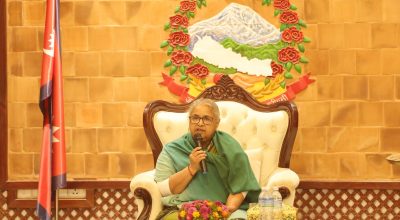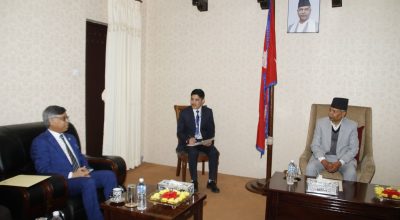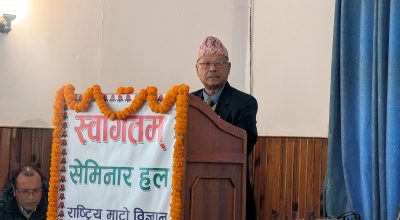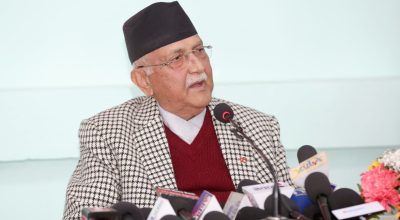
Narayan Prasad Ghimire
Kathmandu, Jan 22: It has not been long that a noted historian Yuval Noah Harari warned, “Once Artificial Intelligence (AI) makes better decisions than us about careers and perhaps even relationships, our concept of humanity and of life will have to change.”
The spurt of AI has swayed the world. In his book, one of the most read in modern time, ’21 Lessons for the 21st Century,’ published in 2018, Harari had made several warnings for the future generation, among which threat of AI is one.
However, it was not only Harari to alert the world on AI potentials and threats. Number of researchers, sociologists, computer scientists, development practitioners, tech optimists and pessimists were making similar predictions.
Undoubtedly, the emergence of AI created euphoria as the internet and printing press had done in the respective times.
Disruption of information ecosystem, breach of hierarchy and assault on power dynamics are resulted with thriving printing press and the internet.
Now, same has been intensified by AI at an unimaginable scale and speed. With accelerated creation of data, application of algorithm and competitive race on AI across the globe, a new world order is being created where tech giants are on top.
Already enslaved, huge section of humanity is at the receiving end, while those playing with AI are spreading optimism and enjoying from the ‘winner-take-all’ model of tech business.
Amidst this, the warning of the historian Harari counts much. With the hijacking of brain, the machines fed with AI have begun giving more precise results than the humans.
As such, is it simply ease, please and convenience to human or grave threat to human brain and cognition? It warrants serious debate and discussion. When the OpenAI launched ChatGPT in November 2022, it quickly spread global shock wave.
The content generation in no time dazzled the human. Give a command, and it serves you instantly. The Google was evidently dwarfed by the ChatGPT.
From a student’s homework to university research, it dominated the landscapes of modern information, knowledge, innovation and technology. Co-authoring with ChatGPT became a new fad. However, it could not remain without criticisms. Many launched astute analyses.
Several journals resorted to banning ChatGPT as co-author. The OpenAI however continued advancements. ChatGPT-3 was advanced to GPT-4 in March 2023.
It undoubtedly marveled creation of diverse contents- text, image, video. Isn’t it a better decision than humans as Harari viewed? AI-generated images rife in Nepal Some months back, with the onset of winter, the Facebook and Twitter in Nepal were rife with AI-generated images showing some people ready to eat hot steamed dumplings (momo) while some ready to grab cups of scalded tea and coffee.
Now, media have begun using relevant images as well. There are not simply the cases of AI benefits, but the assault on humanity. With the content (text-story, poem, play, photo, video) creation by AI, huge numbers of jobs are already in crisis. It is sheer threat to human life.
Even in Nepal, many content writers, translators and editors have lost jobs, thereby facing dent in their incomes and financial sustainability. In this wake, a research report released recently by the International Monetary Fund (IMF) must have taken many by surprise.
The IMF report, named ‘Gen-AI: Artificial Intelligence and the Future of Work’ stated, “Almost 40 percent of global employment is exposed to AI, with advanced economies at greater risk, but also better poised to exploit AI benefits than emerging market and developing economies.
In advanced economies, about 60 percent of jobs are exposed to AI, due to prevalence of cognitive-task-oriented jobs.”
Moreover, the report warned that ‘a new measure of potential AI complementarity suggests that, of these, about half may be negatively affected by AI’.
“Overall exposure is 40 percent in emerging market economies and 26 percent in low-income countries,” the report explained. Al allowed in writing legal opinions in UK On the other hand, a news story on positive side of AI has been a headline in global media.
The UK judges were allowed to use AI in writing legal notes/opinion but with cautions. The Nepali media- The Rising Nepal, and Th
e Kathmandu Post dailies – also covered the news from Associated Press. The Rising Nepal published the news under the headline, ‘Approval given to use AI in writing legal opinions’ in its 6th page, while The Kathmandu Post made it a front-page story, ‘UK permits judges in England and Wales to use AI in writing legal opinions’ on January 9.
The news stated, “The Courts and Tribunals Judiciary last month said AI could help write opinions but stressed it should not be used for research or legal analyses because the technology can fabricate information and provide misleading, in accurate and biased information.”
The above cases are indeed the examples of ‘creative disruption’ of AI. As the story suggested caution required over fabrication of information, the spread of misinformation, disinformation, mal-information and deep-fake with the use of AI is another grave challenge. 2024 is an election year, where dozens of elections are being held including in India, US, and the UK.
Whether the AI will influence electoral integrity has been a matter for concern. Researchers are engrossed on it.
The super speed of disinformation and deep fakes with AI is a headache to many professionals and governments. Guterres lambasts tech giants Moreover, the UN Secretary General, Antonio Guterres, recently lambasted tech companies during his address during the World Economic Forum at Davos, Switzerland.
The Guardian wrote, ‘ Big technology companies are recklessly pursuing profits from artificial intelligence and urgent action is needed to mitigate the risks from the rapidly growing sector, the head of the United Nations has warned.’
When it comes to the regulation of AI, the US, EU and China are large players in digital and AI race and governance.
The US has fostered liberal competitive digital atmosphere, thereby contributing to thriving AI race among tech companies, while China is focused on cyber sovereignty and advancing AI accordingly.
Equally important role is played by the EU countries, advancing research and urging for ethical and responsible use of AI.
The EU seems engrossed on emerging as a global leader of tech regulation. It is time to ponder the spurt of artificial intelligence (AI), which is gripping us at scale.
We are at watershed moment that the non-humans are sprawling and stalking the sacrosanct terrain of humans- the cognition- and rendering the humans irrelevant.
Informed, intellect debate essential As the yawning digital divide has already crippled poor and marginalized countries and communities, the tech empires which dominate the global AI race are likely to further afflict the vulnerable ones.
Networking, collaboration, knowledge and information creation and sharing without jeopardizing national interest is essential for the countries like Nepal to reap benefit from AI.
In this regard, the Ministry of Communications and Information Technology is learnt to be preparing Artificial Intelligence Policy.
The Ministry can facilitate and forward the debate and discussions on AI under the leadership of informed, educated and intellect milieu rather than mediocre rallying. #Nepal
















